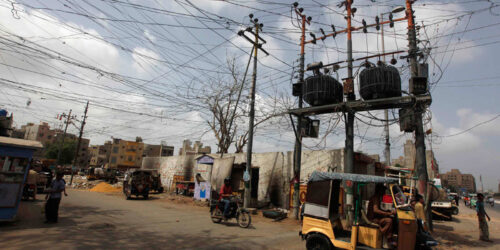ISLAMABAD: While de-linking the past payables and receivables worth hundreds of billions of rupees, the government and the K-Electric have agreed to sign a new power purchase agreement (PPA) for supply of a total of 2,050MW to Karachi — instead of historic 650MW — under which the government would make timely payment of tariff subsidies and the KE would clear its power bills through standby letters of credit (SBLC).
In doing so, the government has made a commitment to also sign a separate agreement for payment of market-based mark-up on delayed subsidy payments by the ministry of finance. The KE would provide SBLCs backed by an escrow account to ensure that the Central Power Purchase Agency (CPPA) gets automatic payments for the monthly bills on account of power supply to the KE. The old payables and receivables would be settled through arbitration.
An official said a key demand of the KE for linking subsidy payments with payment of power bills to the CPPA remained unresolved at a meeting of a sub-committee of the Economic Coordination Committee (ECC) constituted on May 5. While the two sides agreed in a positive manner to sign these agreements for smooth payment mechanism and uninterrupted power supply to Karachi, “how KE will provide SBLC and escrow account without the payment of principal amount of subsidy by the finance ministry” was expected to be settled on Monday and thereafter.
It was agreed that liquidity would remain the key challenge for the SBLC or the subsidy payment and hence a solution was required or the KE would have to borrow from banks. The KE also wanted a government guarantee for timely payments of subsidies. At current rates, the monthly power bill payable by the KE is estimated at about Rs13 billion compared to about Rs8-9bn monthly tariff differential subsidy. Further meetings would be required to work on an agreement.
The meeting of the sub-committee held at Governor House in Karachi was convened by federal Minister for Planning and Development Asad Umar and attended by Energy Minister Hammad Azhar, Special Assistant to the Prime Minister on power and petroleum Tabish Guahar, the secretaries of finance and power and a KE team led by its chief executive officer Moonis Alvi.
Mr Umar confirmed to Dawn that legacy disputes of payables and receivables had been de-linked. This was necessary to move forward without which it is not possible to provide about 2,050mw electricity to Karachi from the national grid. “KE had been privatised, not Karachi or the people of the city,” he said.
The minister said the supply of 650mw to KE was going on without any legal agreement for years and about 1,400mw would be added now.
Energy Minister Azhar said in a tweet that the government and the KE “agreed upon principles to resolve most of their long standing disputes regarding additional power supply, payment procedures and subsidy disbursements. We will be swiftly moving towards a new PPA, InshAllah”.
On the other hand, the KE said its leadership met with members of the inter-ministerial committee and senior government officials and explained the challenges it faced and presented an update on progress of ongoing projects. “During the meeting the Government of Pakistan representatives reaffirmed their commitment to the people of Karachi and indicated that the PPA will be signed shortly, whereas the Terms of Reference (ToR) document for arbitration of the long standing dispute on payments will also be finalised in next few days”.
Officials said both sides made their presentations on the PPA and additional power supply to Karachi, and discussed associated guarantees and mechanisms of resultant payments. The meeting ended on a positive note hinting that the next steps and drafts related to the PPA would be exchanged within a few days.
The power division contends that Rs212bn is payable by the KE to the Central Power Purchasing Agency (CPPA)/National Transmission and Dispatch Company. The Cabinet Committee on Energy had decided last year to provide 1350-1400mw additional power supply from national grid to the KE to allay sufferings of the people because of power shortages. The NTDC has already started supplying a part of the additional power.
The KE had been seeking the above-mentioned payments and adjustment of those arising out of additional power supply (about 350-400mw over and above the past previous 650mw) against tariff differential subsidy payable by the ministry of finance. Incidentally, the power purchase agreement (PPA) on old 650mw supply had expired in June 2015 but power supply continues.
The power division told the ECC a few days ago that the KE was billing and collecting bills from consumers for entire 1,000mw supply from national grid, including additional 350mw, but was not making payments for 350mw additional supply to the NTDC, and threatened to stop power supply to the KE. The power division demanded non-adjustment of subsidies against transfer price, enhancement of the capacity to 1,400mw on firm and pro-rata basis, standby letter of credit backed with escrow arrangement for replenishment of SBLC upon encashment or grant of access by the KE.





